Symptom 8: High Blood Sugar or Type 2 Diabetes

For many, a little sweet indulgence now and then is nothing to worry about. However, for individuals with Cushing’s disease, a persistent high sugar level in the bloodstream is a glaring symptom. But why would a condition associated with hormone imbalance lead to elevated blood sugar or even Type 2 diabetes?
Here’s where cortisol enters the picture again. This potent hormone impacts how our body processes sugars. With elevated cortisol levels, the body’s cells become resistant to insulin’s effects. Insulin is the hormone responsible for keeping our blood sugar levels in check. But when the cells don’t respond efficiently to insulin, glucose begins to build up in the bloodstream.
High blood sugar doesn’t just remain a singular issue. Over time, it can lead to a cascade of complications. From nerve damage and kidney issues to cardiovascular problems, the ripple effects of uncontrolled blood sugar are far-reaching. It emphasizes the critical need for early detection and holistic management. (8)